In May 2016 we signed up for Folding@Home and formed a ‘Phoenix Web Development’ team. We wanted to display statistics of our contributions on our website. To expedite this we wrote a simple web scraping script to pull numbers from our stats page. Fast forward to November and the Stanford team have just released a REST web API for folding stats. This week we improved our script to retrieve stats from the API. (what’s an API?). We thought it was time for something a little more robust and expanded our script into a small WordPress plugin for anyone to use. The plugin can display stats for a donor or team. Stats are displayed in a HTML table via either a shortcode or sidebar widget. All you need to enter is your team ID or donor name.
Whoa hang on. What is Folding@Home?
Folding@Home is a project run by Stanford University which allows anyone to donate spare computer processing power to help with medical research. The computer processing power is used to simulate protein folding inside the body. This simulation requires millions of calculations to be performed. The more CPUs and GPUs available to perform these calculations, the better.
Proteins are structural elements which perform a huge variety of essential tasks in the body. To perform these different tasks the proteins ‘fold’ into different shapes. A small percentage of proteins fold incorrectly making them unable to perform their task. Sometimes an incorrectly folded protein performs a task detrimental to the body. These incorrectly formed proteins are thought to be the cause of a wide variety of diseases.
Folding@Home assists with research on many different diseases. These diseases include breast cancer, kidney cancer, Alzheimers, Huntington’s Disease, Parkinson’s Disease, and many more.
You can learn more about Folding@Home at their website.
Can I join in?
Yes. Anyone can. Getting started is a cinch. All you have to do is download the software to your computer, install it and run it. Should take you 5 minutes. Stanford have built versions for Windows, Mac OS X and Linux.
Once activated, the Folding@Home software will download a task from a Stanford research project, perform the simulation on your computer and then upload the results back to the project. This process requires no input from you and runs in the background. You can use your computer at the same time it runs.
Optionally you can create or join a team (our’s is ID 230741).
But I don’t have a computer!
If you’ve got an android phone or tablet you’re in luck. There is an android Folding@Home app you can install to help. Only downside to the phone app is that we can’t currently retrieve contribution stats for it. If you’re an Apple user, then bummer, you miss out.
Plugin Details
Where our plugin fits in is after you’ve joined up and run the software. If you have a WordPress website, you can use it to show off your contributions.
Install it
Phoenix Folding@Home Stats is hosted at the wordpress.org repository. You can install it on your WordPress website much like any other plugin. If you’re not in the know, follow these steps:
- Log into your website’s admin area
- Navigate to Plugins->Add New via the main vertical navigation menu
- Search ‘folding’ and the plugin card should appear.
- Click or tap ‘Install Now’.
- When the plugin finished downloading, click or tap ‘Activate’.
After Installation
You can display stats as a widget or shortcode.
- Instructions for displaying the shortcode.
- The widget is displayed just like any other WordPress widget.
The only external resource you’ll need is your donor name or team ID. You will set these when you install the software. To obtain them afterward, open your Folding@Home web control while Folding@Home is running on your computer. The screenshot below shows how to do that in Windows 10.
Web control will open up in your web browser. It should look like the image below. Your username and team number should be on the top left.

Here’s an example of the plugin in action.
| Folding@Home contribution stats for team Phoenix Web Development | |
|---|---|

|
|
| Team ID | 230741 |
| Grand score (points) | 72,186,448 |
| Work units completed | 6,719 |
| Team Ranking | 6,265 of 229,597 teams |
| Report generated on | October 24, 2024, 3:10 pm |

Folding@home allows anyone to assist with disease research by donating their unused computer processing power. To join in, simply download the F@H software. |
|
Have a problem?
Feel free to comment on this post with any bugs or issues. If you want to fix the bug yourself you can submit a pull request at the Phoenix Folding@Home Stats GitHub repository. We also provide support at the WordPress.org forums.






1 Comments
Teknik Telekomunikasi
September 28, 2024 at 12:37 am
What improvements were made to the script after Stanford released the REST web API for folding stats?
Visit us Telkom University
Leave a reply